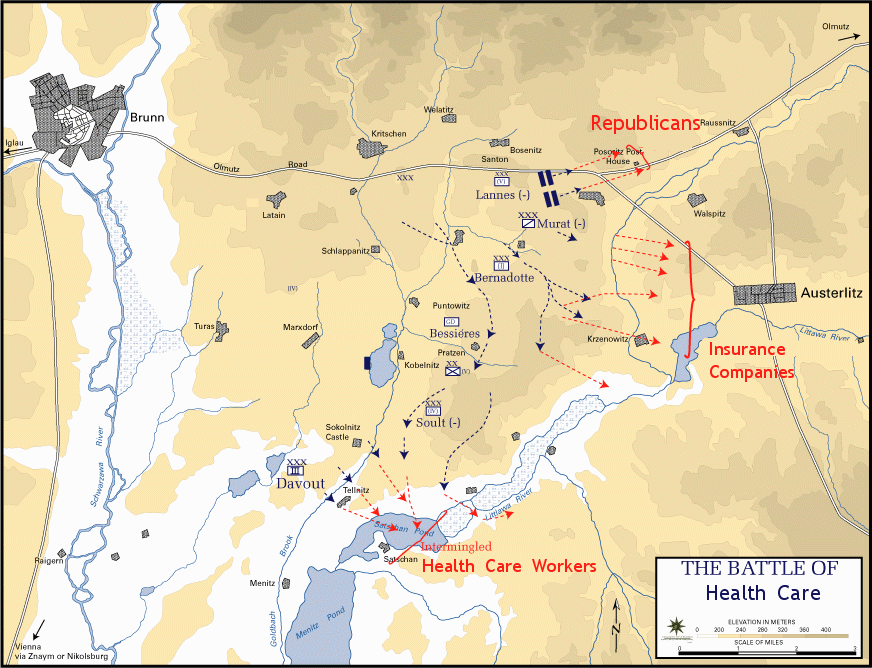If you aren't familiar with military history, or only know the colloquial term, here is a brief summary: Napoleon was a brilliant General during the disastrous French Revolution who made himself Emperor after a coup d'etat. He battered around the continental powers, reinstituted slavery, implemented French modern civil law and tried to invent a new week. Oh, and sold us Louisiana.
After violating that sacred 'don't get into a land war in Russia' axiom, he was exiled to a small island off the coast of Tuscany but he escaped and resumed control of the French Army again. A few months later his career was ended for good.
Waterloo in 1815 seems like a bad analogy for a new president who has been handed control of a bullet-proof majority in Congress. It should be more like Austerlitz in 1805. Let's examine.

Republicans are making semantic points, insurance companies have zero credibility and health care workers are confused. The situation is excellent for big government.
Austerlitz is in Moravia, what is now commonly called Czech Republic. In that battle, he handily defeated the Austrians and the Russians - together - and put an end to the Holy Roman Empire. Not bad for a day's work. He also did it with his Generals saying they were taking on too much. Afterward Tsar Alexander said, "We are babies in the hands of a giant."
Waterloo occurred long after Austerlitz and the man was not the same, nor were the circumstances. As an Army officer we had to study failures and successes and both those battles have corollaries in modern tactics - and politics, since virtually no politician goes a day without using military rhetoric.
I have heard a few misguided partial theories on Waterloo; Napoleon was past his prime, bad weather, the vigor of the English. What cost him most dearly was an unnecessary assault on Hougomont, quite literally a small, fortified farm house of little importance, yet it managed to keep Napoleon occupied instead of tending to more important things. It was a confluence of bad things that ended his reign.
I say Waterloo is a bad example because Obama is not 10 years past his prime, he's inside his first 200 days.
So what are the reasons people are using the term? Hubris is one. Napoleon certainly felt like he was still the legend of the Austerlitz campaign and Obama may feel like he is still running a campaign that future political scientists will study for decades, a campaign that gave him, like Napoleon, a perfect confluence of public weariness, outstanding personality traits for his era and twice the ammunition of his opponent.
He's also fighting a number of opponents. It's very difficult to be the global warming president and the diplomatic president and the health care president and the economic president. Napoleon won by splitting his opponents one by one and forcing them into a separate peace. He lost when he believed through sheer force of will he could defeat everyone at once.
President Obama has a number of things on his side. Health care is expensive in the US and people are not going to listen to political nuance like putting "quality" over "access". At this point, it's meaningless detail and people would rather have access when their kid breaks an arm than the best treatment in the world if they get cancer - especially if someone else will pay for it. Health insurance, as it has always been, is a lousy deal for young people and a great deal for older ones. But if young people are signing up for it - and they are, by every poll out there - and 53% of Americans voted not just for him but went out of their way to vote out anyone who might disagree with him, it's hardly an act of desperation for him to follow his plan.
Waterloo had a victor, it just happened to be a British shoemaker rather than a French Emperor. If Obama is instead Wellington and the disorganized forces against him are the French, it takes on a much different connotation. No one in England regards Waterloo as a disaster.
Health care is not Waterloo, his do-or-die battle, November 2012 is. What he does now will pave the way for what happens in 3 years.
But if health care is his Hougomont is yet to be determined.





Comments